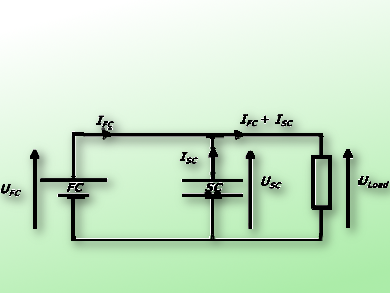Fuel cells (FCs) are a promising technology in transport applications. However, they are little adapted to sudden variations of current. As a result, load peaks can generate a phenomenon known as air starvation, which is responsible for critical voltage drops. This induces stresses at the cell membrane electrode assembly (MEA), causing irreversible degradations, and reducing the FC’s lifetime.
Caroline Bonnet and colleagues, University of Lorraine, CNRS, Nancy Cedex, France, have directly hybridized a 100 cm2 single polymer electrolyte FC to a stack of three paralleled 3,000 F supercapacitors (SC). The team investigated the system in operation in the FC dynamic load cycle, which emulates the energy demand in transported applications. Comparison with regular, non‐hybridized FC operation was analyzed in terms of hydrogen consumption in the case that the gas flow rates are directly controlled by cell current during the cycles with constant gas stoichiometric factors.
The team found that the smoothening effect of the SCs in the overall circuit leads to more even profiles of the cell current and voltage in the cycle. This allows safer and better hydrogen consumption management in this regime. The average H2 consumption per cycle could be reduced by 16 % without change of the overall energy produced.
The runs were done over more than 1,300 hours, the FC performance and capacity were evaluated at regular intervals, with or without hybridization. A moderate positive effect of hybridization was observed in the time variations of the voltage‐current curves and the fuel crossover. However, the resistances for ohmic, charge transfer and diffusion phenomena were not much improved by the hybridization, despite less sharp voltage.
These findings prove that direct hybridization of FC to SCs is technically sustainable and does not damage prematurely the FC. Further tests will optimize the set‐up to emphasize the beneficial impact of the direct hybridization on the FC aging.
- Direct Coupling of PEM Fuel Cell to Supercapacitors for Higher Durability and Better Energy Management,
K. Gérardin, S. Raël, C. Bonnet, D. Arora, F. Lapicque,
Fuel Cells 2018.
https://doi.org/10.1002/fuce.201700041




